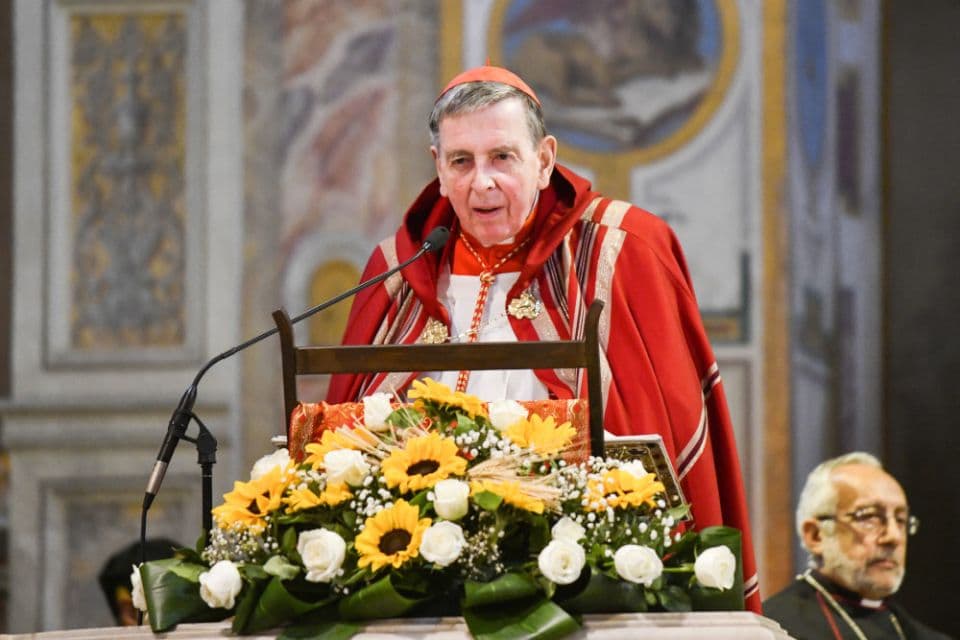ROME – On Tuesday, a private meeting was held in Rome between Swiss Cardinal Kurt Koch and German Bishop Georg Bätzing to clear the air after the latter demanded an apology for remarks alluding to Germany’s Nazi past.
In a statement Wednesday, the spokesman for the German Bishops’ Conference, Matthias Kopp, said a private meeting was held Oct. 4 in Rome between Bätzing, bishop of Limburg and president of the German bishops’ conference, and Koch, president of the Vatican’s department for Promoting Christian Unity.
In his statement, Kopp said the reason for the confidential encounter was “a public controversy about an interview by Cardinal Koch on September 29, 2022, in a newspaper,” and that during the conversation, “Cardinal Koch and Bishop Bätzing each exchanged their positions.”
In a Sept. 29 interview with conservative German weekly Die Tagespost, Koch referred to a guiding text of the German bishops’ ongoing Synodal Path, launched in 2019 to restore trust amid the country’s clerical sexual abuse scandals.
A nation-wide consultation process largely aimed at giving laypeople more space in church leadership, the Synodal Path has become increasingly controversial due to the outspoken calls of prominent participants, laypeople and bishops alike, for women to be ordained priests and for priests to administer blessings to same sex couples.
There have also been votes in favor of eliminating mandatory priestly celibacy and allowing clergy to marry, and to declare that same-sex marriage is not sinful. The process has also insisted that laity have a greater say in the election of bishops.
In his interview, Koch noted that in the orientation text to which he referred, the “signs of the times” and the “sense of faith of the people of God” were both mentioned alongside scripture, tradition, the papal magisterium, and theology as sources of Christian revelation.
“It irritates me that new sources are being accepted alongside Scripture and tradition as sources of revelation; and it frightens me that this is happening — again — in Germany,” Cardinal Koch said, saying “this phenomenon already existed during the National Socialist dictatorship, when the so-called ‘German Christians’ saw God’s new revelation in blood and soil and in the rise of Hitler.”
He argued that the in the process of interpreting the Christian faith attention to the signs of the times is important, but said “they aren’t new sources of revelation. I miss this necessary distinction in the orientation text of the Synodal Path.”
Bätzing response published a response criticizing Koch’s remarks, saying that by making the Nazi comparison, Koch “disqualified himself from the theological debate” about the Synodal Path.
He demanded a mea culpa from Koch, saying, “If a public apology does not happen immediately, I will file an official complaint with the Holy Father.”
Koch then published a statement rejecting accusations that he compared the Synodal Path reforms with Nazi ideology, saying he in no way made the comparison, “and I will never do so.”
“I simply assumed that we can still learn from history today, even from a very difficult period. As the vehement reaction of Bishop Bätzing and others show, I have to realize in retrospect that I failed in this attempt. And I also have to realize that memories of phenomena in the National Socialist period are obviously taboo in Germany,” he said.
Bätzing then issued another response doubling down on his criticism and his demands for an apology, saying Koch’s response “does not apologize for the indefensible statements, but — on the contrary — aggravates them.”
In his statement Wednesday, Kopp said that during Tuesday’s meeting in Rome, Koch assured Bätzing that “he in no way meant the synodal path of the church in Germany or the synodal assembly when he compared the theological debates on the synodal path and the events surrounding the so-called “German Christians” during the Nazi era.”
“Cardinal Koch expressly emphasizes that he has absolutely no intention of accusing the Synodal members of the terrible ideology of the 1930s. Cardinal Koch apologizes to anyone who feels offended by the comparison he made,” the statement said.
After the conversation, Kopp said both Koch and Bätzing “made it clear that the theological debate, to which the cardinal wanted to contribute in the interview, must be continued.”
Follow Elise Ann Allen on Twitter: @eliseannallen














